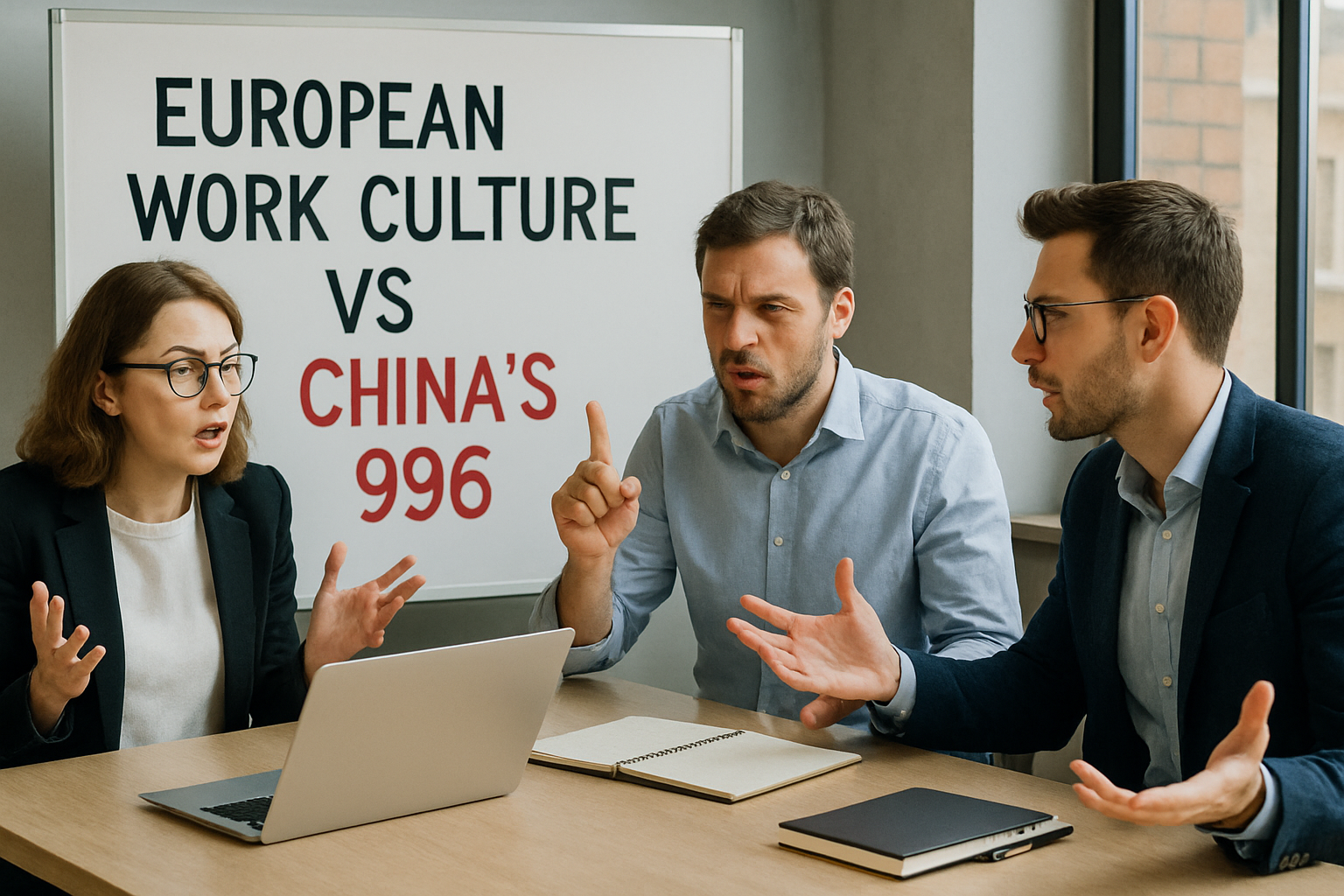The intense debate surrounding the adoption of China’s notorious “996” work culture—working from 9 am to 9 pm, six days a week—is stirring the European startup scene. While proponents argue that stricter work hours could boost competitiveness against tech giants from China and the U.S., many founders and investors in Europe are pushing back. They emphasize sustainable innovation, work-life balance, and mental health over the glorification of overwork. The tension reflects a broader clash between contrasting entrepreneurial cultures and regulatory landscapes. This article explores exclusive insights from seven European startup founders and venture capitalists who challenge the notion that endless hustle is the path to success, offering perspectives on evolving work norms, funding challenges, and the future of Europe’s startup ecosystem.
Europe’s Rejection of China’s 996 Work Culture: A Shift Toward Sustainable Entrepreneurship
In recent years, the “996” work culture—originating in China and epitomized by tech giants such as Alibaba and TikTok—has raised eyebrows worldwide. European startups are increasingly vocal against adopting such demanding routines. Unlike the frenetic pace encouraged in much of China’s tech sector, European founders and investors stress that entrepreneurship should balance intensity with well-being. The 996 culture demands a grueling 72-hour workweek, often leading to employee burnout and high attrition rates, factors that European ecosystems actively seek to avoid.
One of the reasons this debate has gained momentum in Europe is the pressure exerted by certain venture capitalists who perceive longer working hours as necessary to compete globally. Sebastian Becker of Redalpine, for example, has argued that traditional European work limits are too restrictive to contend with the 60-70 hour weeks common in Silicon Valley or China. However, many founders counter that such “hustle-porn” ignores the value of smart, creative work and instead fetishizes overwork.
In fact, many European startups prioritize quality and innovation without sacrificing their employees’ mental health. For example, Husmus co-founder Sarah Wernér insists that rather than emulating China’s toxic work culture, European startups should seek more funding and build powerful teams. Burnout caused by an “always-on” mentality, she argues, leads to lower retention, which harms growth and innovation over the long term.
- Europe’s cultural differences emphasize work-life balance and employee wellbeing compared to China’s aggressive schedules.
- Entrepreneurship in Europe values sustainable innovation rather than sheer work volume.
- Work-life balance is recognized as a critical driver of creativity and long-term productivity.
- Founders resist pressure from some investors promoting the 996 hours norm, advocating smarter work instead.
| Aspect | China’s 996 Culture | European Startup Perspective |
|---|---|---|
| Work Hours per Week | 72 hours (9 am – 9 pm, 6 days) | Typically 40-50 hours with focus on flexibility |
| Employee Wellbeing | Often disregarded, leading to burnout | Prioritized to ensure sustainable productivity |
| Regulatory Environment | Lax enforcement of legal work hour limits | Strict labor laws regulating maximum hours |
| Company Culture | Hustle culture emphasizing sacrifice | Encourages innovation and work-life harmony |
The European approach also aligns better with remote work trends that gained prominence post-pandemic, where flexibility and autonomy have become prized. Founders recognize that modern entrepreneurship does not equate to relentless hours but smart application of talent and technology. They highlight that remote fundraisers in SaaS startups illustrate how successful models can flourish without exhausting work schedules.

Venture Capital Pressure and the Myth of Hustle Culture in the European Startup Ecosystem
Despite resistance, there remains a persistent push from some investors advocating 996-inspired hours for European startups. This reflects a belief that Europe must increase intensity to compete with Silicon Valley’s and China’s meteoric success. Sebastian Becker’s public comments urging German Chancellor Friedrich Merz to raise legal work hour limits demonstrate this pressure. Becker warns that the current 40-hour week regulations won’t allow European startups to outwork their global competitors.
However, several investors and entrepreneurs reveal that such views are outdated. Suranga Chandratillake of Balderton Capital emphasizes that Europe’s tech ecosystem is robust, supporting numerous decacorns—companies worth billions such as Klarna and Revolut. These successes demonstrate that Europe can innovate rapidly without adopting a 996 culture. Furthermore, Chandratillake calls out the “fetishization of overwork” as a myth that fails to understand the subtleties of startup life, where intense periods of work alternate with crucial rest and reflection.
Several founders report that this hustle culture obsession leads to unintended consequences:
- High employee turnover due to burnout and dissatisfaction.
- Struggles in regulatory compliance, as work culture clashes with European labor protections.
- Difficulties attracting diverse talent, particularly from younger generations who prioritize wellness.
For instance, Revolut’s reported struggles, including high churn and regulatory hurdles, have been linked by some founders to their intensive culture, signaling potential downsides of adopting 996. Revolut itself claims to foster a “high-growth, high-performance environment” while focusing on collaborative and scalable culture, reflecting ongoing efforts to balance productivity and wellbeing.
| Startup | Reported Downsides of 996 Culture | Measures Taken |
|---|---|---|
| Revolut | High staff churn, regulatory licensing difficulties | Implemented value-based behaviors and team support systems |
| Various European startups | Employee burnout and poor retention | Promotion of flexible hours and remote work policies |
European investors and founders increasingly note that what their ecosystem requires is not longer hours but more aggressive funding and improved support to level global playing fields. These insights reinforce the idea that endurance alone does not guarantee entrepreneurial success—sustainable growth demands well-resourced, healthy teams.
Work-Life Balance and Cultural Values: Why European Startups Embrace Different Norms from China
A core reason why European startups are wary of the 996 work model lies in the continent’s deeply rooted cultural and regulatory values emphasizing work-life balance. Unlike China’s relentless hustle, European countries maintain strict labor regulations, limiting maximum working hours and enforcing paid leave. These protections reflect societal priorities focused on mental health, family time, and personal growth, factors not easily compatible with a 996 grind.
Founders such as Noa Khamallah of Don’t Quit Ventures stress that Europe’s top tech success stories—from Spotify to SAP—achieved global leadership through fostering innovation cultures prioritizing wellbeing instead of overwork. She cites Silicon Valley’s Uber and Meta as cautionary tales of unchecked “move fast and break things” approaches clashing with European values on worker rights and sustainable practices.
Moreover, public sentiment among younger generations reinforces this divergence. Millennials and Gen Z employees are less inclined to endure toxic hustle cultures, demanding more flexibility and meaningful work. Jas Schembri-Stothart, founder of Luna, a wellness app, highlights how toxic overwork deters young talent from entering or staying in startups:
- Gen Z employees exhibit lower tolerance for perpetual hustle demands.
- Work-life balance is a decisive factor for talent attraction and retention.
- Toxic work cultures lead to resentment, higher churn, and reputational damage.
| Demographic Group | Attitude Towards Hustle Culture | Preferred Workplace Values |
|---|---|---|
| Gen Z | Low tolerance; advocates balance and mental health | Flexibility, meaningful work, work-life balance |
| Millennials | Moderate to low tolerance; prioritize sustainability | Transparent communication, work-life harmony |
| Older Generations | Higher tolerance; often experienced in hustle cultures | Hard work ethic, career progression |
European startups leverage these values to build environments that nurture creativity and long-term growth. By contrast, China’s 996 culture often exacerbates stress and diminishes holistic employee engagement. This cultural emphasis on balance also aligns with the growing global move towards mental health awareness in workplaces, reinforcing Europe’s model as more attuned to contemporary workforce needs.

Innovation, Funding, and the True Path to Global Startup Success Outside of 996
European startup founders stress that the key to thriving on the global stage is not by increasing personal working hours but through greater funding access, innovation, and strategic support. The continent’s tech ventures have notably lagged behind their U.S. and Chinese counterparts in growth-stage funding—losing an estimated $375 billion since 2015—hindering scale and competitive stamina.
Founders like Sarah Wernér argue that capital availability allows startups to hire enough talent to maintain intense work periods without risking burnout, contrasting with smaller, over-worked teams struggling to keep pace. The core challenge is thus financial and structural rather than individual endurance.
This perspective is echoed by Jas Schembri-Stothart, who highlights the importance of a strong ecosystem, stating that competing with U.S. or Chinese firms requires robust local support, talent pools, and investment. Numerous European startups have successfully showcased innovation without 996 hours, aided by policies supporting remote work, flexible conditions, and sustainable growth strategies. For example, startups featured in reports such as the MUBI unicorn valuation case demonstrate how strategic ecosystem support drives scale.
- Investment shortfalls have hampered European startups’ ability to grow and scale globally.
- Access to talent and capital is more critical than hours worked for innovation and sustainability.
- Innovative funding mechanisms targeting early and growth stages are fostering ecosystem resilience.
- Remote work and technology enable efficient collaboration beyond traditional work hour models.
| Key Challenge | Impact | Recommended Solution |
|---|---|---|
| Funding Gap | Restricted growth and scaling potential | Increased venture capital and resource allocation |
| Talent Shortage | Overburdened teams & burnout risk | Competitive salaries and sustainable work practices |
| Culture Clash | Difficulty adopting foreign work cultures | Emphasize tailored and balanced work environments |
Innovators are increasingly leveraging new trends such as AI to maximize efficiency, which Timothy Armoo of Fanbytes highlights as key to reducing manual workloads. This technological edge allows founders to maintain competitiveness without resorting to 996 hours. Moreover, startup founders can learn from the failures and successes documented in tales like the rise and downfall of some AI tech builders, where culture and funding interplay decisively shaped outcomes.
Practical Realities: Balancing Ambition and Wellbeing in Europe’s Startup Future
While rejecting a strict 996 ethic, European startup founders admit there are seasons that demand intense hustle, particularly in early-stage ventures. Bloom Money founder Nina Mohanty notes that founders often unintentionally embrace 996-like workloads during critical growth phases, driven by passion and necessity.
Jas Schembri-Stothart emphasizes the importance of choice and leadership in setting boundaries, distinguishing between voluntary intense work and enforcing toxic “always on” cultures. This nuance is essential for maintaining team morale and long-term productivity.
Some investors warn that normalizing 996 expectations risks shutting out brilliant founders who value mental health or have caregiving responsibilities. Dion McKenzie highlights how such norms can skew venture funding away from inclusive innovation, jeopardizing diversity and sustainability in the startup ecosystem.
- Intense hustle phases are inevitable but need careful management.
- Leadership choices define whether overwork becomes toxic or inspirational.
- Mental health considerations increasingly influence funding decisions and talent attraction.
- Inclusivity and diversity require flexible norms beyond rigid 996 schedules.
| Phase of Startup Growth | Work Culture Characteristics | Recommendations to Balance |
|---|---|---|
| Early Stage | High intensity with occasional long hours | Use technology to optimize work, encourage rest periods |
| Growth Stage | Balanced workloads with sustainable team sizes | Secure funding to expand teams and avoid burnout |
| Maturity | Standardized work hours fostering innovation | Maintain work-life balance policies and employee development |
This balanced approach harmonizes ambition with human needs, facilitating European startups’ prospects in forming resilient ecosystems. The ongoing debate over work culture underlines the importance of tailoring practices to regional values while learning from global examples. For those interested in startup success strategies and ecosystems, exploring how AI unlocks unicorn potential provides insight into maximizing innovation without compromising health.
Frequently Asked Questions About 996 Work Culture in European Startups
- Q: What is the 996 work culture?
A: It refers to working from 9 am to 9 pm, six days a week, totaling 72 hours. Originating in China’s tech sector, it aims to maximize productivity but often causes burnout.
- Q: Why is Europe’s startup scene resistant to adopting 996?
A: Because European cultures and regulations emphasize work-life balance, mental health, and sustainable innovation, conflicting with the intense demands of 996.
- Q: How does funding impact European startups in relation to work culture?
A: Lack of aggressive funding often forces small teams to overwork to compete. Increasing investment helps build larger, more sustainable teams without resorting to 996 schedules.
- Q: Are there any benefits to 996 according to European founders?
A: Some acknowledge occasional intense work phases are necessary but stress that sustained overwork harms morale and productivity.
- Q: How do remote work and technology influence European startup work culture?
A: They allow for flexible hours and optimized task completion, reducing the need for extended workdays typical of 996 while supporting innovation.


